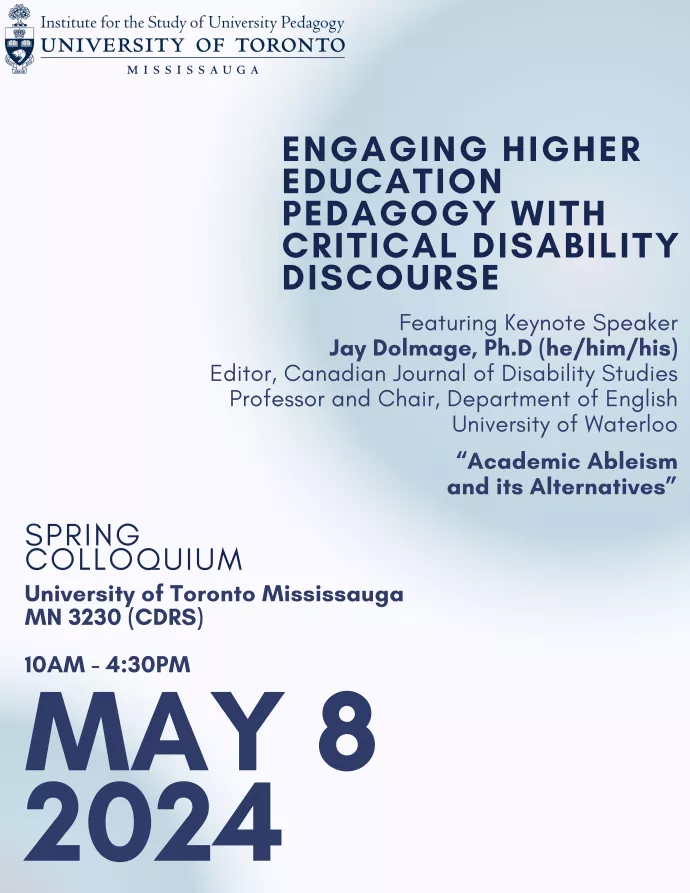Engaging Higher Education Pedagogy with Critical Disability Discourse
Wednesday, May 8, 2024, from 10:00AM – 4:30PM EST
University of Toronto Mississauga, Maanjiwe nendamowinan building, Room 3230 (CDRS).
Deadline to register is end of day on May 2, 2024.
Funded by the Institute for the Study of University Pedagogy (ISUP) and the Collaborative Digital Research Space (CDRS).
Refreshments and a light lunch will be served.
American Sign Language (ASL) will be available throughout the duration of the event.
*Please note this will be a photographed event. Kindly advise personnel at the registration table should you wish to not be photographed. This event will not be recorded.*

Detailed Program
10:00AM Arrival & Refreshments
10:15AM Welcome Note / Introductions
10:30AM Keynote Speaker w/ Dr. Jay Dolmage (45 mins) + Q&A (15 mins)
11:30AM Paper 1 (20 mins) + Q&A (10 mins)
12:00PM Lunch
1:00PM Paper 2 (20 mins) + Q&A (10 mins)
1:30PM Roundtable 1 (60 mins incl. Q&A)
2:30PM Paper 3 (20 mins) + Q&A (10 mins)
3:00PM Roundtable 2 (60 mins incl. Q&A)
4:00PM Appreciation Note / Closing Remarks / Networking
Keynote Speaker
Jay Dolmage, Ph.D (he/him/his)
Editor, Canadian Journal of Disability Studies
Professor of English
Chair, Department of English
University of Waterloo
"I am committed to disability rights and justice in my scholarship, service, and teaching. My work brings together rhetoric, writing, disability studies, and critical pedagogy. My first book, entitled Disability Rhetoric, was published with Syracuse University Press in 2014. Academic Ableism: Disability and Higher Education was published with Michigan University Press in 2017 and is available in an open-access version online. Disabled Upon Arrival: Eugenics, Immigration, and the Construction of Race and Disability was published in 2018 with Ohio State University Press. I am the Founding Editor of the Canadian Journal of Disability Studies."
Academic Ableism and its Alternatives (Keynote, 10:30AM)
We have a crisis of help-seeking around disability on our college and University campuses. The vast majority of disabled students will leave our campuses without ever seeking help.
This could be because higher education has built and enforced definitions of disability that are primarily medical: we see disability all over our campuses, in all kinds of different departments, but it is understood as a series of unwanted symptoms, a problem to be solved – not as the positive identity and culture most disabled people understand it to be.
Or it could be because, in the history of disability in higher education, a rights-based approach has often meant that disabled students are invited in the door, they are counted and added to diversity statistics, but then the culture of the University makes no changes to account for their presence, participation, and thriving.
Or it could be because, most often, the only time disability is spoken or written about in class is in the final line of the syllabus, when students are referred to the Office of Disability Services should they desire assistance. The message to students is that disability is at the back door of the syllabus – and then there is just a limited range of accommodations offered. More than three-quarters of the accommodations granted are the same, with very minimal accommodations, such as extended time on tests and exams.
On the other hand, we have had an opportunity, over the last four years, to redesign higher education in ways we never have before. Yet, few people were talking about accessibility as part of this process. For example, we spent much more time investing in surveillant test-proctoring software than we spent developing alternatives to outdated teaching models that rely on testing.
Still, we learned that accommodations can help students in the classroom, including asynchronous access to course materials, alternatives to outdated forms of assessment, and flexibility around forms of attendance and participation.
Of course, if we planned for more disabled students in our classrooms, we could really change the shape of higher education. What if we allocated all of the energy we spend on adapting to an old educational regime based on timing and testing into building a new one in which disabled students don’t always need to ask for accommodations, but instead, their needs are expected?
In this presentation and discussion, some of these possibilities for building a more accessible classroom and campus will be suggested and explored. Come and share your own experiences, ideas, challenges, and questions.
